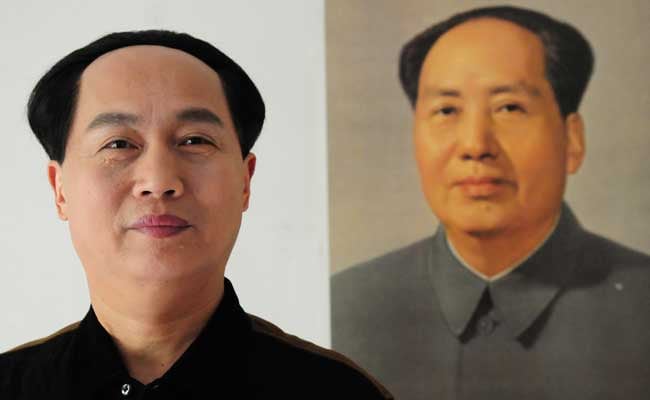
He has little interest in politics and is no socialist fanatic, but Xu Ruilin spends every free moment practising how to speak, write, walk and think like Mao Zedong.
The 58-year-old has an eerie resemblance to the founding father of Communist China, and is one of scores of lookalike Chinese actors in ever increasing demand as production of historical propaganda television shows and films goes into overdrive.
Known as "texing yanyuan" - "special type of actors" - each one portrays a particular departed leader in voice, looks and style, akin to Elvis impersonators for famous Communists.
As well as Mao, their alter egos include his right hand man Zhou Enlai, economic reformer Deng Xiaoping and a host of other top brass.
Since President Xi Jinping came to power in 2012 and launched a crackdown on dissent, China's broadcast censors have narrowed what is deemed acceptable, sending producers flocking to the relative safety of shows and films in line with the Communist Party's approved version of history.
"Actors and directors told me for years I should play Chairman Mao, but mostly I ignored them," said Xu, who spent most of his career in the theatre.
"But these days there are so many opportunities to play Mao."
Even out of character, Xu has the Great Helmsman's hair and features. At work, he completes the transformation with a signature artificial chin mole, a grey Mao suit -- the trousers hiked far above the navel -- and by chain-smoking cigarettes.
He is constantly working on his Hunan dialect, the provincial inflected Chinese of Mao's home, and the leader's particular style of calligraphy, still used for the masthead of the ruling party's mouthpiece newspaper the People's Daily.
Even Mao Xinyu, Mao's corpulent grandson and a major general in the People's Liberation Army, has given him his blessing, saying he was "very satisfied" with his performance, Xu said.
The more fortunate actors get starring screen roles, but most mimics are relegated, like their hip-gyrating Elvis brethren, to playing to smaller audiences, renting themselves out for corporate events, weddings and birthdays.
"Company tours always start with a rousing speech and then I'm treated like a visiting dignitary, like the real Mao, during a tour," said Xu, days after an appearance at a battery factory.
'We Are Party Members'
The vast majority of Chinese television historical dramas centre on the country's recent past, often set during Japan's 20th-century invasion and occupation, and with Communist Party cadres always the heroes.
They have seen a marked increase since Xi took power, accounting for roughly 44 percent of all Chinese shows produced in 2013, according to statistics from the State Administration of Press, Publication, Radio, Film and Television (SAPPRFT), the most recent available.
Most of the entries on one SAPPRFT list of 127 "recommended television programmes for broadcast" leaked by Chinese media last year were propaganda pieces, with titles including "Deng Xiaoping at History's Crossroads", "Zhu De, a Founding Father" and "We Are Party Members".
Plot lines in other shows are also subject to the censors' whim, which has seen time travel, one-night stands, the use of sex in espionage, and women falling in love with more than one man all banned as subjects, along with wordplay and puns.
"Restrictions placed on most programmes make them very difficult to produce, but anyone is completely free to make anti-Japanese or historical shows," Zhu Dake, a professor at Shanghai's Tongji University, told AFP.
"In order to avoid spending a lot of money only to have a programme censored, everyone's making so-called historical shows because they have less restrictions and there's less risk."
Soviet import
The special actor concept was largely an import from the Soviet Union, beginning in the late 1970s in the wake of Mao's death and initially limited to one or two actors constantly reprising their roles.
It has expanded in tandem with the media landscape and been a boon for Guo Weihua, who could be a twin of Zhou Enlai, but drives a Mercedes and sips lattes at Starbucks.
"I used to play other parts, but now there's too many projects with Zhou Enlai I almost always play him," said Guo, 52. "He has already gone into my bone marrow, when I'm standing in front of a camera, I am Zhou Enlai."
After appearing as Zhou in more than 70 television series and films, Guo would like to diversify but is thoroughly typecast.
"For Chinese people of a certain age, we have a saying," he said. "Mao Zedong and Zhou Enlai, these two great men, were sent by God."
In 1942, Mao himself said that art must "serve the masses" and decried bourgeois literature and art, adding that works attacking the Communist Party should be severely criticised and repudiated.
President Xi takes a similar line. In October he said artists should spread "Chinese values" and not be "slaves" to the market, nor "go astray while answering the question of whom to serve".
It is a question that even the lookalike actors should be asking themselves, according to Professor Zhu, bemoaning the abilities of some recent recruits.
"The newcomers that play Mao Zedong these days, they haven't read Mao's biography, they haven't read Mao's writings," he said. "So how can they play him well?"
Track Latest News Live on NDTV.com and get news updates from India and around the world

